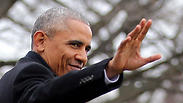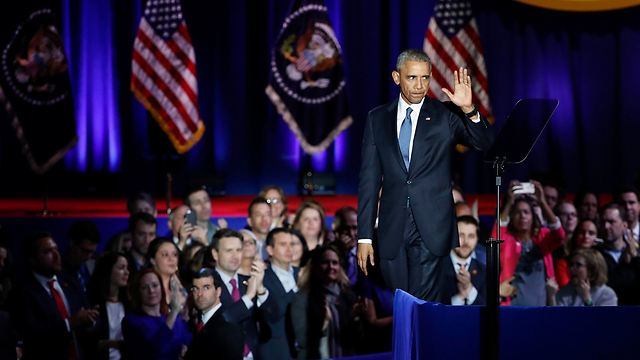
Obama. Wanted to be an internal president
צילום: רויטרס
Obama, the effective pragmatist
Op-ed: Within America, the outgoing US president was a successful – almost remarkable – manager. He was, however, a mediocre international statesman. The price of this gap will be paid by America, the world – and Israel too.
What is left of the Obama legacy? Not the Nobel Peace Prize. That prize will be hidden deep in the closet by President Barack Obama in the coming years. His approach towards the Israeli-Palestinian process failed. His approach in Syria – constantly avoiding intervention – led to a humanitarian disaster, which led to a geostrategic disaster. Putin was not the world’s strongest person in 2008, and he definitely appears to be the world’s strongest person today. The European Union, a cornerstone of the American global security, is facing disbandment threats.

His big successes were the agreement to open up Cuba, a historical issue with limited international significance, and of course the agreement with Iran. It’s possible that in a decade or two the gloomy prophecies will have been proven wrong, and that the agreement will lead to Iran’s incorporation into the international community and weaken its involvement in terror, as well as to a possible abandonment of the nuclear program. At the moment, that doesn’t seem likely.

Obama’s legacy was and remains what he really wanted to do: Change America from the inside (Photo: EPA) (צילום: EPA)
Obama’s legacy was and remains what he really wanted to do: Change America from the inside. He wanted to be an internal president. There have been many presidents who did not want to do that. John Kennedy, for instance, always dreamt about the international arena and considered minimum wage a boring thing. Obama was the opposite. He wanted to change America itself.
A president’s term should not be judged when he leaves office, but later on, when the outlook become clearer. Obama’s project in America was one of the most ambitious projects in the past 100 years. He received a nation which was considered conservative, estranging itself from the world, seeking revenge after 9/11. Obama pulled the American forces out of Iraq and most of Afghanistan, saved a lot of money and invested in major social initiatives like his health reform.
This reform really was the highlight, because of the huge expenses on private insurance and health in America. The result is that the percentage of uninsured Americans, those who are afraid to go to the doctor because they don’t have money to pay for the service, was cut by half. The percentage of uninsured citizens is now the lowest in American history. There are many failures in this plan, and the premiums have started getting out of control in the past 18 months, but it’s better than an America in which a family that loses a job cannot afford to take one of its members to the doctor when he is very ill. Moreover, Obama correctly detected that this is the most important angle in the American reality for closing social gaps.
Here’s a point: It’s not a very good health reform. It includes a complicated method of insurance-related commerce arenas, some on a state level and some on a national level. Clearly, America would have been better off with a simple method like in Israel, France or Britain – public health suppliers that are called HMOs in Israel. But Obama, unlike Bill Clinton at the time, realized that it won’t work. He wanted to cross the Rubicon of the health reform, and he did.
Now Donald Trump is vowing to cancel everything, and that may happen, but even the president-elect understands that the number of insured Americans is growing, and if he stops this progress – the public will seek revenge at the polling stations. In this sense, Obama chose pragmatism over radicalism in order to mark a line. The line has been marked, and tens of millions of people have gained the minimum respect of knowing that if they fall ill, they will be able to care for themselves.
Obama made such decisions repeatedly. When his legislation efforts failed, he used presidential decrees. His accomplishments are sometimes pushed aside. Take, for example, the figures about former US Army servicemen who are homeless. Since 2010, the number of homeless people who served in the US Army has been cut by 47 percent, because the Department of Veterans Affairs worked hard, and worked well, and thanks to legislation passed with Congress’ help. This is just one example of his administration’s successes.
There is a legacy here and there is a conclusion. Obama’s legacy is effective pragmatism, ongoing use of presidential power to change America. Within America, Obama was a successful – almost remarkable – manager. He was, however, a mediocre international statesman. The price of this gap will be paid by America, the world – and Israel too.
Nadav Eyal is Channel 10's chief international correspondent.










